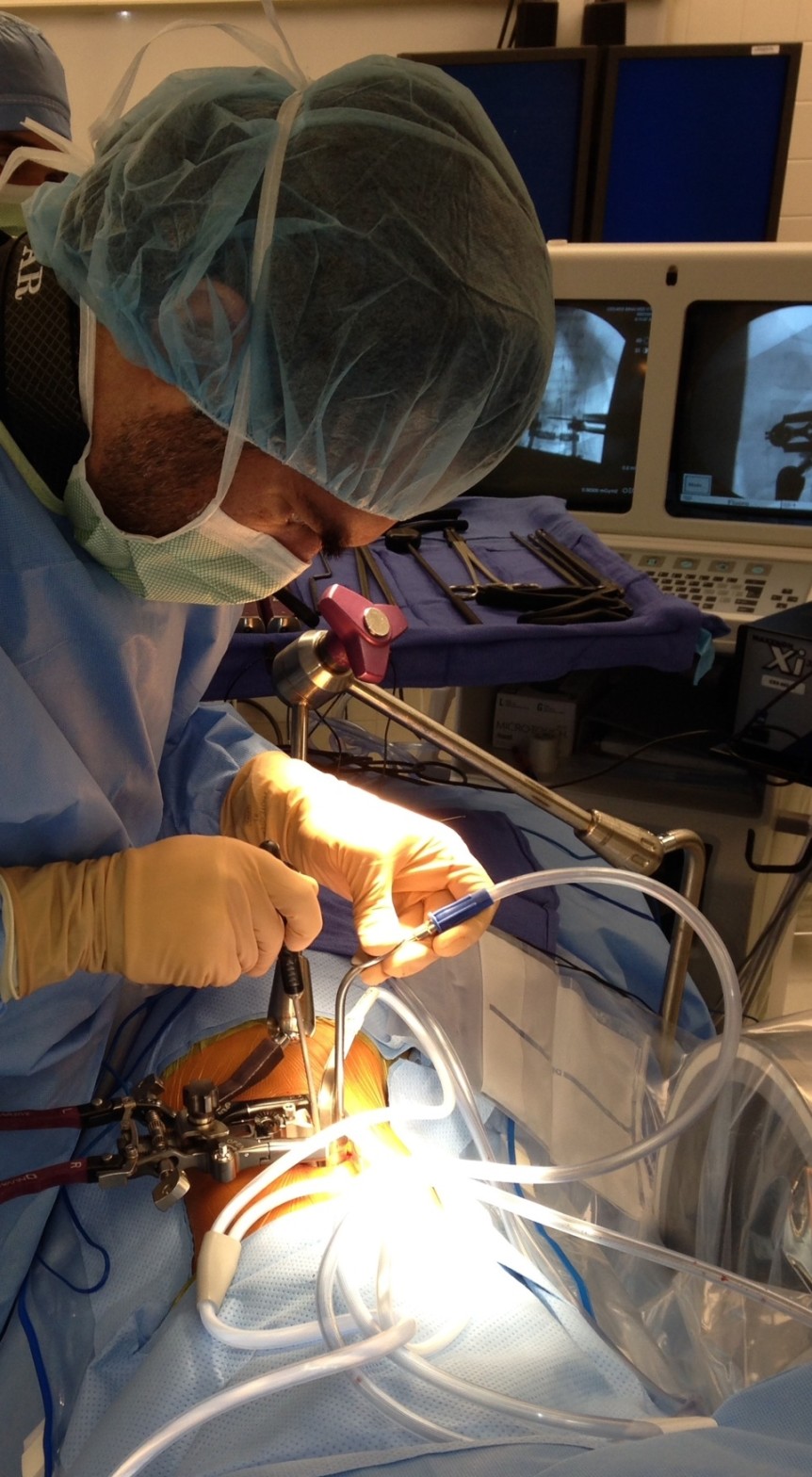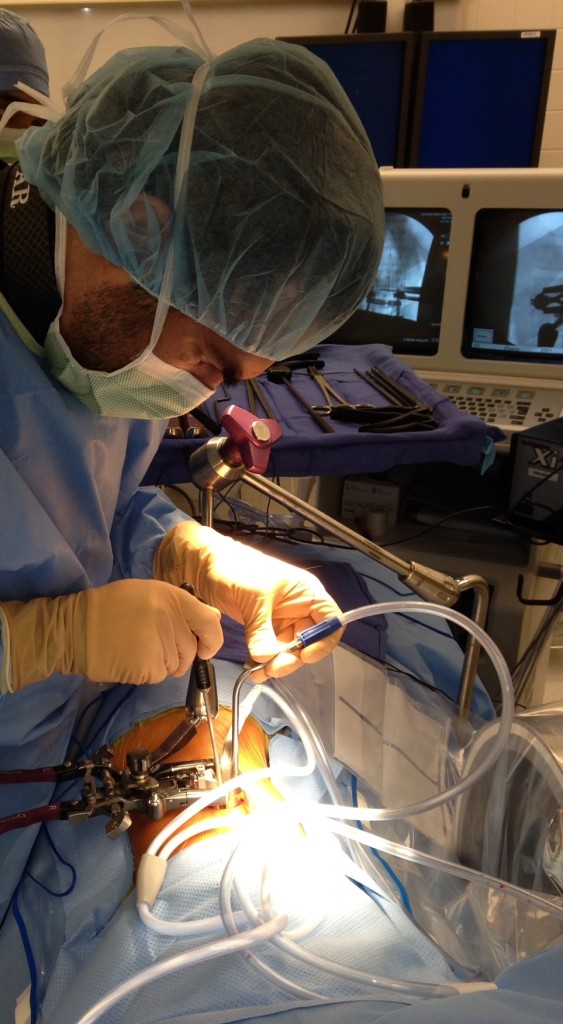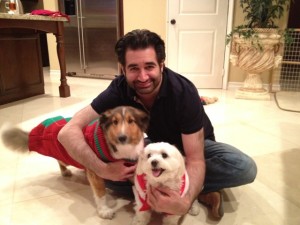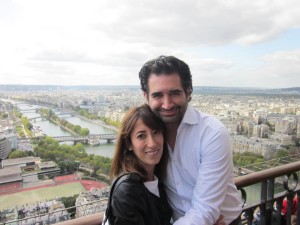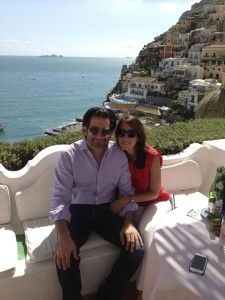
What do you remember about your life when you were five years old? I remember running around outdoors, squealing with delight as I rolled down grassy hills, and catching dozens of frogs when it rained. What spine surgeon Dr. Alex Rasouli remembers is very different.
He recalls, “I wrote my first computer program when I was five years old. It was about basic language. I was learning vocabulary at that age and my program allowed me to write a multiple choice test of vocabulary words. We had a Texas Instrument computer and I programmed it to generate a test of words and a collection of randomly-generated definitions, all of which were wrong except one. I would have to pick out the correct definition. It also printed out flash cards for me. I loved technology; I loved computers. I was a computer geek.”
Being precocious continued throughout his life. At age ten, without any computer training, he wrote an algorithm that would prevent a computer from generating the same number twice in a row. “On the surface, that looks like a pretty boring and useless thing,” he said, “but when it comes down to randomly generating a test or randomly selecting people out of a queue, you don’t want the same thing to come up twice. It takes a lot of computer know-how to do that, but if you have a passion for something or it comes to you naturally, you just intuitively figure out what to do.
“When I got my first car, I turned it into nearly an autonomous self-driving car, years before Mercedes made theirs. I had another car that I interfaced with a full-fledged Macintosh computer at the center screen,” he said.
Alex Rasouli was born in London. His family moved to San Diego when he was six months old. The family moved to Salt Lake City for three years, then to Fullerton and Newport in Orange County. After graduating from Stanford, he went to med school at U.C. Irvine, did his residency at UCI, then a fellowship at the University of Miami-Jackson Memorial Medical Center. “They take only one orthopedic resident each year. Those are the best fellowships,” he says. “You get to see everything. All of the attention is on you and all of the scrutiny is on you.
“Then when I became a professional in this medical career, I was the one who brought computer-guided surgery in the spine to Cedars-Sinai with the help of my colleagues who are in leadership positions.
“The same things that are required for you to be good at with computers make you good at surgery, which is a very logical, focus-driven algorithmic process where one task can’t be completed unless another task before it is completed. At the same time,
there’s this art in surgery that’s not scientific or focus driven, but is just art – an expression of something that you can’t quite describe.
The same is true with computers. Yes, it’s all numbers, binaries, codes, routines, sub-routines, but there’s an art in being able to put it together and apply it to an everyday task.”
The surgeons at Cedars soon learned they had an incredible computer whiz in their midst. Much more on that later. Let’s go back to Dr. Rasouli’s younger years.
“I chose not to move through school more quickly than others of my age. We had that option, but I just went through school like anyone else and did well. I finished most of my high school course work about a year ahead of time, but I chose not to graduate early. Instead, during my last year of high school, I did computer modeling of HIV mutation rates at UC Irvine. That required computer programming. HIV is a virus that is like the flu virus. Every year the flu virus mutates and changes and HIV does that except maybe thousands of times faster, which is why finding a vaccine or a cure has been challenging, because you’re working to find a cure for what you thought was HIV, but the next day HIV is a completely different virus, with limits of course.
“Since HIV was a significant epidemic at the time I was going through high school, I decided to apply some of my knowledge to that, and we came up with a model of how to follow the way HIV mutates within a person, within a people, and also across patients. It turned out that when HIV goes from person to person, only particular strains of those hyper-mutating strains are transmitted. So while it can change rapidly within a person, when it is transmitted to another person, it resets, the clock resets close to what it was when the first person got it before transmitting it to another person. There are only particular strains that are not significantly changed that are chosen to go on. A lot of people capitalized upon that concept to work toward a vaccine.”
As of today, researchers think they are on the verge of a breakthrough toward that vaccine. It’s interesting that a teenage boy in Southern California helped them reach that stage.
In junior high school, Alex had decided to become a doctor, because he was really interested in science. But science for what purpose? “Everyone has a purpose in life,” he says. “In my opinion, my purpose is to mix my passion for technology and passion for people, and I think medicine is a natural hybridization of the two.”
“My first exposure to surgery was at Stanford in a cardio-thoracic lab where we would operate on living sheep’s hearts, transplanting heart valves or placing in prosthetic heart valves. It was intense; there was no room for mistakes. I was always drawn toward the most challenging aspect of any field. Maybe I was seeking an adrenaline rush; maybe I was bored by anything else. That’s when I decided to do surgery. The stakes were high.
“I gravitated toward orthopedics. Of all the rotations in orthopedics, spine surgery appealed to me the most, because it was by far the hardest. They were the longest surgeries, the most physically demanding for both the patient and the physician, with no room for error. If there is maybe 1% room for error in all the other fields of orthopedics, there is zero room for error in the spine. That’s a significant amount of responsibility to take on. It’s so hard that technological innovations such as augmented reality, digital surgery, and robotic surgery are a perfect match for me. What the human eye can’t see, we can get help with from technology.”
This is where Dr. Rasouli grows animated, talking about future possibilities. “Augmented reality lets you see the physical world as it appears to you unaided or unenhanced, but then on top of what you see are projected other pieces of information. We could see where the underlying neurological structures are.
When you’re looking at the spine, you only see the one dimension of bone. You don’t see what’s under it, and you don’t see what’s under that and under that. It would be nice for you to see whatever you want in three dimensions.
“Any augmented reality that works knows where your head is looking in space and if I’m looking at, say that door, the computer would know I’m looking at that door and would project information about that door. Google glass is merely an elegant iteration of augmented reality. We were using bigger goggles before Google glass was available, but it will get to a point where either a doctor will wear a contact lens during a surgery or goggles that are small and lightweight. My dream for surgery is to be able to go into the OR wearing something like that so there’s absolutely no guess work. It would work on the concept of a patient having X-rays or MRIs before the surgery and then those studies being fed into a computer and synced up in three dimensions with the way the patient is positioned in the operating room.”
“For a lot of the more complex surgeries we do these days, and that my very talented colleagues do these days, we get CT Scans of the patients that go into the computer three-dimensionalized, and the computer tells us where to put our screws and rods to minimalize risk of injury to the patient. It guides our hands figuratively now but I’ll bet in about five years, it will guide our hands literally through robots that use that information to tell us where to put various instruments.
“The logical extension of all this is that one day maybe a surgeon won’t need to be there the whole time. Robots will do the surgery and they’ll do it better than we could. That has significant cultural and legal hurdles to go across. I’m not necessarily advocating that. I’m just saying you can’t stop technology. If it lets you do something better, more safely, it’s going to happen, if not in ten years, maybe in fifty years.”
When asked what surgery Dr. Rasouli thinks he perform best, he doesn’t hesitate, saying “anterior cervical surgeries.” Those could be fusions or they could be artificial disk replacements in which the native disk is taken out and instead of fusing the patient, a prosthetic device is inserted that still allows some motion. The theoretical benefit, not yet irrefutably proven but basically proven, is that if you preserve motion, you may spare excessive motion at the other levels that could in turn degenerate. Dr. Rasouli has been doing artificial disk replacements for seven years.
“There was one big breakthrough with the devices and significant inertia afterward, because we’re living in an insurance environment that decided it wasn’t going to pay for innovation anymore. Companies stopped studying and making new disk replacements, because insurance companies don’t pay to have those new disks used. It’ll get better later – everything has cycles and phases. Until then, what made American medicine great, which is innovation and controlled risk-taking, which led to even greater innovation, those things that made our medicine great are simply not in play right now. We’re working off what we came up with years ago and pretty soon another country or another culture may come up with new ways of doing things. If you read the scientific journals right now, you won’t believe the preponderance of papers that come from Japan or China and a decreasing number of original manuscripts, papers, research articles, or discoveries that come from the western world, mainly the United States. We’ve taken the concept of control by agencies and regulations and regulatory bodies to an extreme where it’s suffocating innovation. For instance, the augmented reality: I can’t begin to describe the hurdles that I would have to overcome to be able to use that in a case in the hospital. It exists in a rudimentary form that we need to perfect, but even when we perfected it, the companies with which I would work to get to that level would think twice because they’d think, ‘what’s the bottom line? Will insurance companies say it’s experimental?’ Experimental used to be a great word. Now it’s a curse word. That’s the unfortunate aspect of our field is now we’re dealing with a number of decision-makers in key positions who would rather sit comfortably than push the envelope a little bit: CEOs of insurance companies, government officials, people who have lost the conviction to do great things because they’re afraid of either getting sued, or because they answer to special interests, or because they’re watching out for their pocket books. Every society has an ebb and flow; every society has a peak and a trough. I hope we’re not heading for a trough, because if we don’t do these great innovative things that I described, other societies will. Technology will not stand still.”
With all that talent and all that understanding of how medical decisions are wrapped up in business and politics, there clearly has to be down time in which to replenish his high enthusiasm. He lost a visible amount of weight recently from working non-stop. So let’s slow down and look behind the scenes at the man who is the surgeon.
“My wife Lily (dentist Lily Ghafouri, DDS) is the fun in my life. She grounds me.” They walk with their dogs Joelie (left) and Charlie (right) around Holmby Hills for exercise and time together in the morning. They spend their weekends in Newport where they have a house and week days in Westwood where they have a small apartment. “On weekends, we walk along Marguerite Ave. in Newport. We don’t go in the ocean, but we walk right by it.” They are avid readers of both fiction and non-fiction. Dr. Rasouli is currently reading Anna Karenina for the second time while Dr. Ghafouri is reading War and Peace. Yes, they like Russian literature.
“The journal Nature is my favorite periodical. I love books about World War II, the last war in modern history where we had a rise of undivided conviction and we acted on it.”
The two doctors take a break for two weeks at a time to have fun traveling. “Paris is my favorite city in the world,” say Dr. Rasouli. “We’ve been there three times and intend to go back again.”
The hard part of travel for Dr. Rasouli is taking the two weeks away from his practice. He has to ramp down by doing a lot of surgeries the week before, then significantly fewer surgeries the week of his departure so that by the time he leaves there aren’t any loose ends regarding patient care.
They also enjoy visiting Italy, most recently to Positano on the Amalfi Coast.
When he returns, he remembers how blessed he is to be practicing in an institution where all of his colleagues are exceptionally talented. “I wouldn’t hesitate letting any of them operate on me,” he says. “I have high regard for my colleagues. Ted Goldstein (Theodore Goldstein, M.D.) is our exceptional leader, not divisive in any way. It’s a pleasure to witness his leadership as he bring us all under the same umbrella, so to speak.”
Something I learned about Dr. Rasouli is that he has a sweet tooth and he particularly likes dark chocolate. And that his patients like to hug him. He says, “Patients need to feel that the doctor cares, is on their side, is part of their ‘family.’ So I tell patients, ‘I would never do or recommend for you anything that I wouldn’t recommend for a family member.’ You need to have a level of conscience that lets you say that with full integrity. Patients are happy with that and that develops trust, so they hug me.”
The word honorable kept coming to mind as I listened to Dr. Rasouli. Now, writing this, I wonder if the words “augmented,” “preponderance,” and “iteration” were part of his vocabulary test that he created when he was five. The words “brilliant” and “honorable” most certainly should have been.
Lynda Huey, M.S., founder of CompletePT Pool & Land Physical Therapy and Huey’s Athletic Network, is a former athlete and coach whose own injuries led her into the water to find fitness and healing. She was educated at San Jose State University where she starred on the track and field team during its golden years. Lynda is the author of four books on water exercise and water rehabilitation. Lynda is happy to answer the questions of any of her followers on Twitter.com/lyndahuey.

